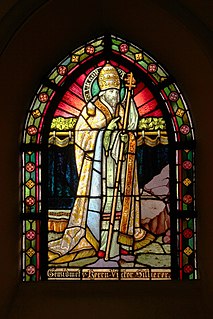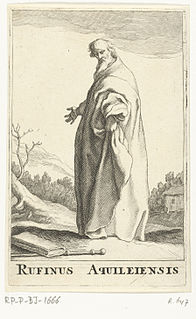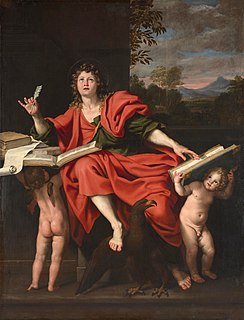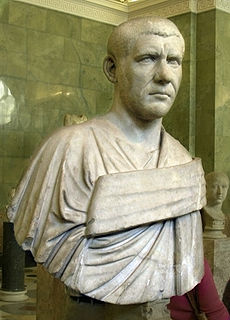Related Research Articles
Ambrose of Alexandria was a friend of the Christian theologian Origen. Ambrose was attracted by Origen's fame as a teacher, and visited the Catechetical School of Alexandria in 212. At first a gnostic Valentinian and Marcionist, Ambrose, through Origen's teaching, eventually rejected this theology and became Origen's constant companion, and was ordained deacon. He plied Origen with questions, and urged him to write his Commentaries on the books of the Bible, and, as a wealthy nobleman and courtier, he provided his teacher with books for his studies and secretaries to lighten the labor of composition.

Eusebius of Caesarea, also known as Eusebius Pamphili, was a Greek historian of Christianity, exegete, and Christian polemicist. In about AD 314 he became the bishop of Caesarea Maritima in the Roman province of Syria Palaestina. Together with Pamphilus, he was a scholar of the biblical canon and is regarded as one of the most learned Christians during late antiquity. He wrote Demonstrations of the Gospel, Preparations for the Gospel and On Discrepancies between the Gospels, studies of the biblical text. As "Father of Church History", he produced the Ecclesiastical History, On the Life of Pamphilus, the Chronicle and On the Martyrs. He also produced a biographical work on Constantine the Great, the first Christian Roman emperor, who was augustus between AD 306 and AD 337.
Eusebius of Nicomedia was an Arian priest who baptized Constantine the Great on his deathbed in 337. A fifth-century legend evolved that Pope Saint Sylvester I was the one to baptize Constantine, but this is dismissed by scholars as a forgery 'to amend the historical memory of the Arian baptism that the emperor received at the end of his life, and instead to attribute an unequivocally orthodox baptism to him.' He was a bishop of Berytus in Phoenicia. He was later made the bishop of Nicomedia, where the Imperial court resided. He lived finally in Constantinople from 338 up to his death.
The First Council of Nicaea was a council of Christian bishops convened in the Bithynian city of Nicaea by the Roman Emperor Constantine I in AD 325.
Pope Linus was the bishop of Rome from c. AD 67 to his death. As with all the early popes, he was later canonized.

Pope Victor I was the bishop of Rome in the late second century. The dates of his tenure are uncertain, but one source states he became pope in 189 and gives the year of his death as 199. He was the first bishop of Rome born in the Roman Province of Africa—probably in Leptis Magna. He was later considered a saint. His feast day was celebrated on 28 July as "St Victor I, Pope and Martyr".

James the Just, or a variation of James, brother of the Lord, was "a brother of Jesus", according to the New Testament. He was an early leader of the Jerusalem Church of the Apostolic Age. He was murdered as a martyr in AD 62 or 69 after being stoned to death by the Pharisees on order of High Priest Ananus ben Ananus.
Hegesippus, also known as Hegesippus the Nazarene, was a Christian writer of the early Church who may have been a Jewish convert and certainly wrote against heresies of the Gnostics and of Marcion. The dates that Hegesippus flourished are insecurely fixed by the statement of Eusebius that the death and apotheosis of Antinous (130) occurred in Hegesippus' lifetime, and that he came to Rome under Pope Anicetus and wrote in the time of Pope Eleuterus.
The Apostolic Fathers were core Christian theologians among the Church Fathers who lived in the 1st and 2nd centuries AD, who are believed to have personally known some of the Twelve Apostles, or to have been significantly influenced by them. Their writings, though widely circulated in Early Christianity, were not included in the canon of the New Testament. Many of the writings derive from the same time period and geographical location as other works of early Christian literature which came to be part of the New Testament. Some of the writings found among the Apostolic Fathers appear to have been as highly regarded as some of the writings which became the New Testament.

Tyrannius Rufinus, also called Rufinus of Aquileia or Rufinus of Concordia (344/345–411), was a monk, historian, and theologian. He is best known as a translator of Greek patristic material, especially the work of Origen, into Latin.

Saint Quadratus of Athens was a Greek Apostolic Father, bishop of Athens. He is counted among the Seventy Apostles in the tradition of the Eastern Churches.

John the Presbyter was an obscure figure of the early Church who is either distinguished from or identified with the Apostle John and/or John of Patmos. He appears in fragments from the church father Papias of Hierapolis as one of the author's sources and is first unequivocally distinguished from the Apostle by Eusebius of Caesarea. He is frequently proposed by some as an alternative author of some or all of the Johannine books in the New Testament.

According to the Gospel of John, Mary of Clopas was one of the women present at the crucifixion of Jesus and bringing supplies for his funeral. The expression Mary of Clopas in the Greek text is ambiguous as to whether Mary was the daughter or wife of Clopas, but exegesis has commonly favoured the reading "wife of Clopas". Hegesippus identified Clopas as a brother of Saint Joseph. In the Roman Martyrology she is remembered with Saint Salome on April 24.

Lucifer of Cagliari was a bishop of Cagliari in Sardinia known for his passionate opposition to Arianism. He is venerated as a Saint in Sardinia, though his status remains controversial.

Saint Pantaenus the Philosopher was a Greek theologian and a significant figure in the Catechetical School of Alexandria from around AD 180. This school was the earliest catechetical school, and became influential in the development of Christian theology.

The Augustinian hypothesis is a solution to the synoptic problem, which concerns the origin of the Gospels of the New Testament. The hypothesis holds that Matthew was written first, by Matthew the Evangelist. Mark the Evangelist wrote the Gospel of Mark second and used Matthew and the preaching of Peter as sources. Luke the Evangelist wrote the Gospel of Luke and was aware of the two Gospels that preceded him. Unlike some competing hypotheses, this hypothesis does not rely on, nor does it argue for, the existence of any document that is not explicitly mentioned in historical testimony. Instead, the hypothesis draws primarily upon historical testimony, rather than textual criticism, as the central line of evidence. The foundation of evidence for the hypothesis is the writings of the Church Fathers: historical sources dating back to as early as the first half of the 2nd century, which have been held as authoritative by most Christians for nearly two millennia. Adherents to the Augustinian hypothesis view it as a simple, coherent solution to the synoptic problem.

De Viris Illustribus is a collection of short biographies of 135 authors, written in Latin, by the 4th-century Latin Church Father Jerome. He completed this work at Bethlehem in 392–393 AD. The work consists of a prologue plus 135 chapters, each consisting of a brief biography. Jerome himself is the subject of the final chapter. A Greek version of the book, possibly by the same Sophronius who is the subject of Chapter 134, also survives. Many biographies take as their subject figures important in Christian Church history and pay especial attention to their careers as writers. It "was written as an apologetic work to prove that the Church had produced learned men." The book was dedicated to Flavius Lucius Dexter, who served as high chamberlain to Theodosius I and as praetorian prefect to Honorius. Dexter was the son of Saint Pacianus, who is eulogized in the work.
Crescans was a Cynic philosopher who attacked the Christians, and was in turn, attacked by Justin Martyr. Eusebius, writing 150 years later, accused him of causing Justin's death.

Philip the Arab was one of the few 3rd-century Roman emperors sympathetic to Christians, although his relationship with Christianity is obscure and controversial. Philip was born in Auranitis, an Arab district east of the Sea of Galilee. The urban and Hellenized centers of the region were Christianized in the early years of the 3rd century via major Christian centers at Bosra and Edessa, but there is little evidence of Christian presence in the small villages of the region in this period, such as Philip's birthplace at Philippopolis. Philip served as praetorian prefect, commander of the Praetorian Guard, from 242; he was made emperor in 244. In 249, after a brief civil war, he was killed at the hands of his successor, Decius.
Eros of Antioch was Bishop and Patriarch of Antioch from about 154 AD until c. 169 AD. Eusebius puts his reign from the fifth year of Antoninus Pius and his successor Theophilus of Antioch as dating from the ninth year of Marcus Aurelius. Jerome says his rule began in 142 AD though this is doubted.
References
- ↑ Eusebius. "28". Musanus and His Writings. Church History. Vol. IV.
- ↑ Musanus by Jerome